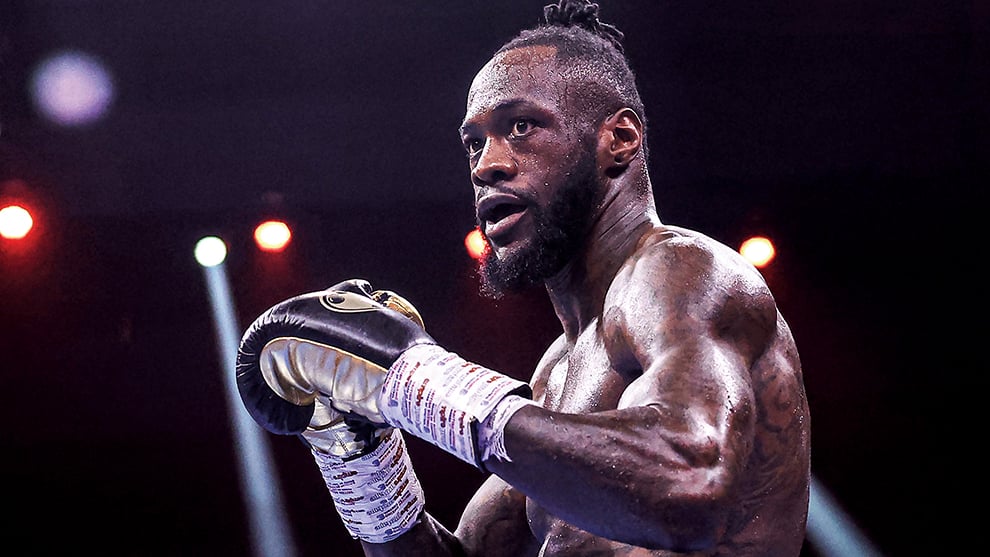Although some may attribute Deontay Wilder’s poor performance in Saudi Arabia on June 1 to his recent retirement allusions, the true explanation for the decline in his form likely stems from a period preceding that.
It is true, yes, that a boxer hinting at retirement typically leads to a certain kind of performance – usually, a loss – but Wilder’s fears of late have been concerned with more than simply regression or The End. In fact, whereas once he was the man of whom violence was expected, now, in what is perhaps the cruellest of all twists, Wilder has become the man whose awareness of violence, be it his own or in general terms, has somewhat inconveniently affected his ability to be himself.
The doubt first surfaced around the time of his most brutal act: a swift and decisive victory over Robert Helenius in 2022. On that fateful night, after a long break from the ring, the former WBC heavyweight champion left his Finnish opponent, who had once been his sparring partner, incapacitated on the canvas. It was a devastating right hook, one of many in his illustrious career, that left Helenius twitching and unable to continue. This particular win not only reintroduced Wilder to the world of heavyweight boxing but also unexpectedly took something from him that he would never be able to recover.
During a press conference, Wilder expressed his admiration for Helenius and then addressed the tragic story of Prichard Colon, a boxer whose life and career were permanently altered in 2015. This heartfelt moment showcased a vulnerable side of Wilder that surprised and resonated with many. Despite his previous controversial statements about wanting to harm his opponents, this display of emotion endeared him to a new audience who found this version of Wilder to be genuine, uplifting, and preferable.
Despite this, for Wilder, it marked the start of his downfall in many ways. By openly exposing this hidden aspect of himself, he not only demonstrated an understanding of the harshness and high stakes of his sport, but also indicated a change in his own mindset and intentions. Previously, Wilder had maintained a necessary ignorance and emotional detachment, but now he appeared to have matured, albeit in a detrimental manner for a boxer.

Wilder exhibits caution as he steps into the ring for his fight against Joseph Parker. (Image credit: Richard Pelham/Getty Images)
Without a doubt, a boxer who fears both the potential damage inflicted upon them and the damage they can cause to their opponent is worse than one who is only afraid of the former. Unfortunately, this is the state that Deontay Wilder has found himself in since his fight against Helenius. Alongside his own inherent flaws and natural decline due to age (he is now 38), Wilder has also faced tough opponents in Joseph Parker and Zhilei Zhang. As a result, the Wilder we see today is a far cry from the Wilder of the past. Everything about him has changed. His expression when being outworked by an opponent is different; it no longer reflects a man seeking an opportunity but rather a man gasping for air. What’s more concerning is the look on Wilder’s face when he tries to land punches. These punches are no longer thrown to secure a knockout but rather to regain control or provide some relief. This alteration, while somewhat promising, has undeniably taken something away from Wilder as a fighter. For someone whose entire strategy relied on their attitude and belief in their ability to knock out their opponent, even the slightest hesitation or doubt distorts and destroys the fearsome monster he once was.
Once again, we witnessed undeniable proof of this when Zhang faced off against Wilder. Similar to Parker in the past, Zhang effortlessly pursued and dominated Wilder, showing no fear of retaliation. It was truly a privilege for Zhang, especially considering the sheer terror that previous opponents had displayed when facing Wilder. With a substantial weight advantage (68 pounds heavier than Wilder at the weigh-in), Zhang capitalized on his size to maneuver Wilder around the ring, corner him, and unleash punches at will. This was an ideal scenario for Zhang, who was known for his efficiency. He effortlessly secured rounds without exerting much effort or taking significant risks, while simultaneously pressuring Wilder to constantly improve, take more chances, and inevitably expose himself to devastating blows.
Which brings us to round five, the rough in which Zhang clipped Wilder with a perfect right hook counter before then finishing him with a second hook moments later. These two shots – the first spinning Wilder around, and the second laying him out – came as no real shock, admittedly, yet still we must appreciate how surreal it was to see such a feared heavyweight get dealt with so easily. It happens to the best of them, of course, particularly the big punchers, but what, I think, makes Wilder’s swift demise so interesting is how complicit he has been in what has happened to him. Whether meaning to or not, Wilder has, in growing old in the sport, both matured and at the same time moved away from what made him such an unpredictable, devastating and scary proposition for any heavyweight sharing a ring with him. He has, in accepting the reality and consequences of both his own damage and the damage inflicted upon him by others, become both half the man he used to be and twice the man he used to be; a paradox no good for any boxer in need of eradicating their human side in order to become, on fight night, a machine capable of hurting another person with a beating heart and a loving family. “Once a thing is known, it can never be unknown,” wrote Anita Brookner. “It can only be forgotten.”
Undoubtedly, Wilder’s perspective and experience have undergone a transformation during his fights. Whether it’s witnessing Prichard Colon’s inspiring journey towards rebuilding his life or recalling the intense pressure he faced while succumbing to Tyson Fury in either 2020 or 2021, his visions have evolved. Alternatively, he envisions the sight of Robert Helenius rendered motionless by his powerful right hand, precisely executing his desired outcome.
Wilder’s perception has changed drastically as he witnesses things nowadays. The images that come his way are accompanied by unfamiliar emotions and sensations. These images have transformed into a three-dimensional form, becoming tangible enough to touch and even smell. Similar to carrying photographs of a deceased loved one, Wilder now embodies the role of a retired army general, grappling with the realization of inhumane actions he had hoped were long gone, rather than the cold and heartless destroyer that the boxing world once adored.
Memory and complicity work differently for humans compared to other things. While a boxer may temporarily forget or separate certain things, humans do not have the same ability. In fact, it is often a person’s inability to forget and compartmentalize that influences their actions and defines their character. In Deontay Wilder’s case, his inability to forget is evident in the delays, hesitations, and defeats he has experienced. This also highlights the pressing need for him to transition from being a professional boxer to a civilian, where emotions can have a positive impact instead of putting him at risk. Otherwise, there is a danger of eventually forgetting everything.
